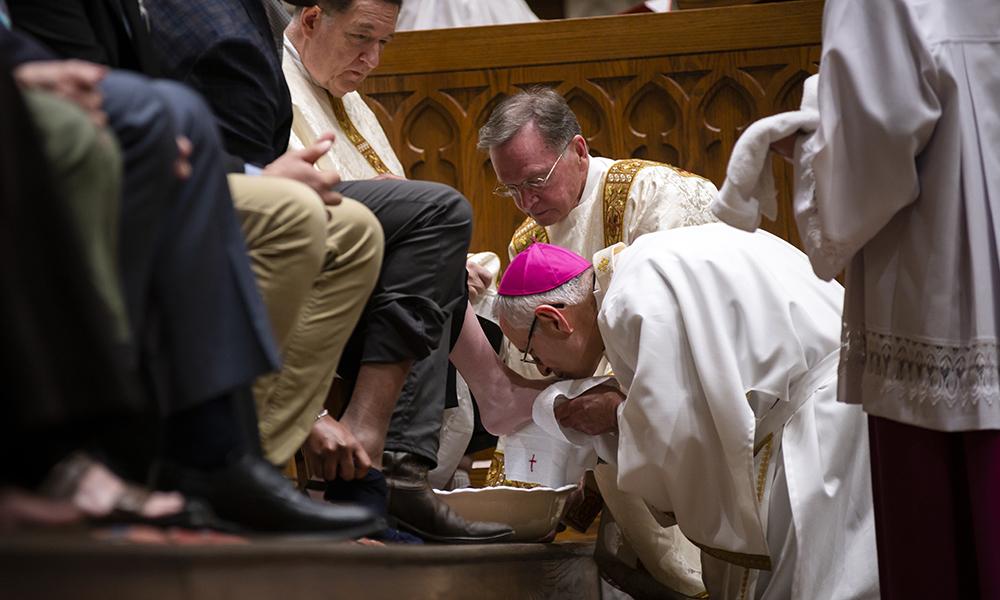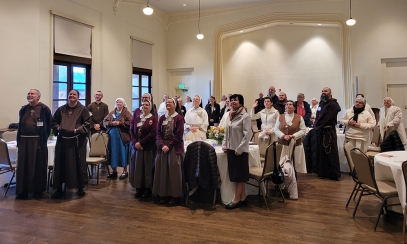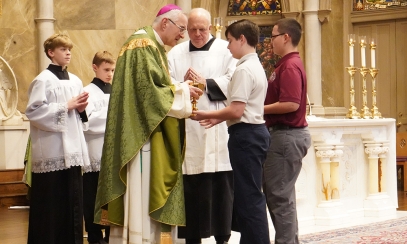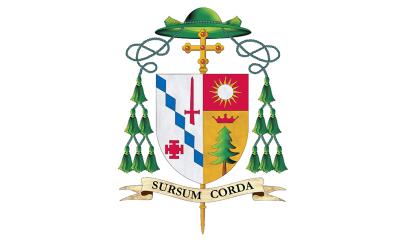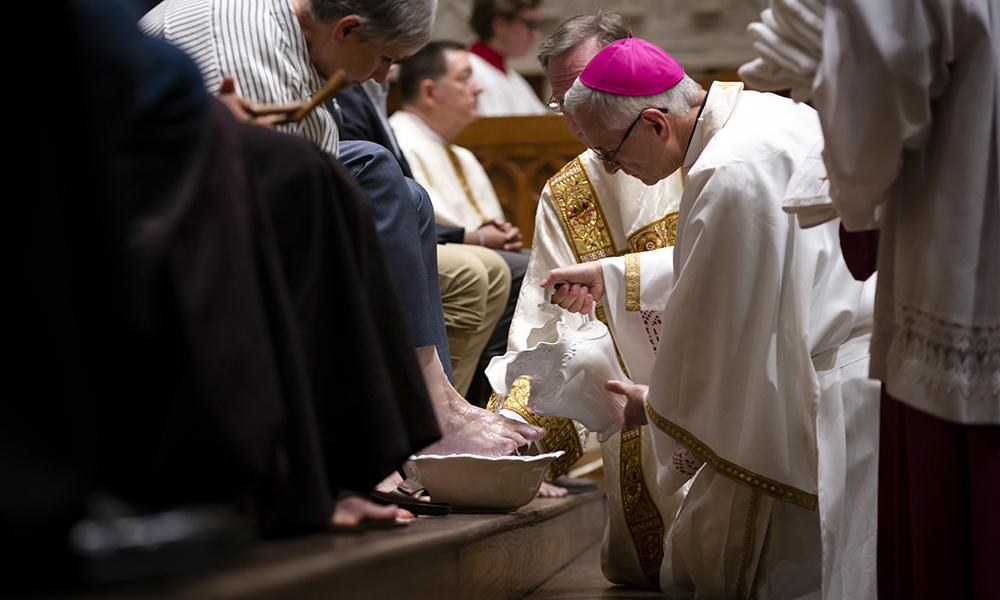
‘The Lamb of Sacrifice for Our Salvation’
Paschal Triduum Begins With Mass of the Lord’s Supper
Paschal Triduum Begins With Mass of the Lord’s Supper
On April 14, Bishop Raica began the Paschal Triduum with the Mass of the Lord’s Supper at the Cathedral of St. Paul. The complete text of his homily follows herein.
On April 14, Bishop Raica began the Paschal Triduum with the Mass of the Lord’s Supper at the Cathedral of St. Paul. The complete text of his homily follows herein.
My friends, we gather this evening to begin our Paschal Triduum with the Mass of the Lord’s Supper. It is the moment in which our Lord established the priesthood and Eucharist along with the mandatum – the mandate to “love one another.” It is also a moment when we go to the garden to pray – to be with our Lord as He prepares through His own intense prayer to give Himself as the Lamb of sacrifice for our salvation.
Especially tonight, we come together as a Church family to commemorate the institution of the Eucharist and the priesthood. Jesus leaves us His Body and Blood as a gift to us. By partaking of His Body and Blood, we become more and more like Him. We make our way through Holy Thursday, Good Friday, and Easter. We follow Jesus as He gave Himself for us. We remember the words of St. John, “There is no greater love than this, that one lay down his life for his friends.” (cf. Jn 15:13) We are very touched by this because Jesus lays down His life for us!
So, for us Christians, the Body and Blood of Jesus is not merely a token or nostalgic moment of some historical event. It is not just something nice that Jesus did. No! It is the very center of who we are! If it could not become present again today for us, we would soon forget about what happened. It would be a relic of the past. We would struggle mightily to remember what Jesus did. Indeed, the historic events recounted this evening are a gift of love par excellence.
Reflecting further, we could say that Jesus did not want us to be alone or to fend for ourselves.
Didn’t He remind us, “I am with you always until the end of the world”? (cf. Mt 28:20)
And because of that, He left us the priesthood to perpetuate the Eucharist – the very mystery we celebrate tonight in a solemn way. One of the most important actions a priest does is to celebrate the Eucharist. I am so moved every time I preside at Mass and look out. It is as if we come hungry – hungry for love, hungry for affection, hungry to be noticed, hungry to be found. We come thirsty – thirsty for the water of life like the Samaritan woman; thirsty for something to refresh our parched voices from begging just like the Israelites wandering through the desert and Moses striking the rock and water gushing out to slake their thirst and refresh them on the journey to the promised land.
At the end of it all, through our hungers and thirsts, we try to live a life in which our dignity as children of God is acknowledged; a life with opportunity and hope, a life lived in peace. Our hungers and thirsts are at times for a word, a gesture, an indication that we will be alright, that we have hope, that we can be delighted. Indeed, it is something that we can share with one another because we, too, have been touched.
One action that our Church does today may seem rather odd – washing of feet. It is curious that in the account of the Last Supper in the Gospel of John, he doesn’t speak of the institution of the Eucharist but the “washing of feet.” That is to say, the very ministry of Jesus could be summarized as one of serving humanity. At the time of the Lord, I suppose it was not odd or strange with dirty, dusty, and grimy roads. The washing of feet when you entered someone’s home was perhaps a sign of great hospitality and care. Similarly, we participate in this gesture again this year after a brief hiatus to remind us that from this perspective, as we look up, we are servants to one another. Those who are here are the honored guests of Jesus. We are gifted with the ability to serve each other. As such, we don’t live isolated and lonely lives. We reach out to those in need, just as the Lord reached out to us. This is the mandate to “love one another.” Over the past few months as we watched (and continue to do so) with horror the events in Ukraine, the violence in our cities and the chaos in some areas of the world, we need to hear once again the Lord’s command – “What I am doing for you … you must do for one another.” (cf. Jn 13:15) The mandate will not merely be proclaimed from the preacher’s lips in a homily, it must be received with open hearts, with minds seeking to conform themselves to the very mind and will of God who sees us not only as made in His image and likeness (which He cannot hate) but also as part of one beautiful human family in which we are an essential, integral part. We must learn to do the same.
You may be aware that when Jewish families gathered together to celebrate the Passover Meal, it was called a Seder meal and follows a very precise ritual and formula. The event begins when the youngest person present asks the telling question, “Why is this night different from all other nights?” Then the story of Exodus when God freed the Hebrews from pharaoh’s power in Egypt is solemnly and reverently recalled especially highlighting the mighty deeds that God performed for them along the way to freedom and the Promised Land. Indeed, through Jesus our Savior, mighty deeds are still being performed today! Often, we don’t see them because we are not attentive, or are distracted, or tuned more into ourselves, but they are there: deeds of mercy, deeds of love, deeds of hope, deeds so extraordinary that astonish us. They are there! So, tonight, as we reflect on what God is doing in our midst, may our eyes also be opened wide that we may not succumb to our exhaustion but see the good things that have happened through the amazement of Christ’s abiding presence among us. Embracing the Mystery of Christ’s Body and Blood in the Eucharist, through the priesthood, and being destined for a ministry of service removes barriers of distinction so that we become brothers and sisters loved by an all-merciful God.
As we remember the events of the Lord, may we pray for peace, which at times seems so elusive, and enter more deeply into the mysteries of our salvation won for us through Christ. May God bless you all!

